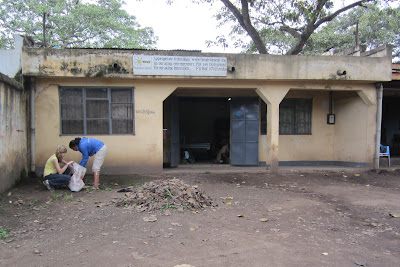This weekend we dove into work on our loose biomass stove. On Saturday we met with Didas, the chairman of
Education Model Organization (EMORG). Based just outside of Arusha in Kisongo,
EMORG is an NGO devoted to the improvement of education. They have constructed a
community library with resources and programming for pre-school, primary, and
secondary school students as well as teachers and community members. EMORG’s
long-term goals include building a school and a vocational training center.
EMORG shares DHE’s commitment to the environment and community health, and they
were very excited to learn about our loose biomass stove project. Potentially
the stove could be constructed by students at the vocational training center
and distributed to families in the Kisongo area served by the library.
But before distribution comes the technical development of
the stove! On Saturday, Didas invited us to his home and we used a fine saw
dust to demonstrate how the loose biomass stove works. Together we
brainstormed some design modifications, such as slightly increasing the
diameter of the stove to accommodate larger cooking pots commonly found in the
markets of Tanzania. Furthermore, Didas encouraged us to try creating a larger
wire mesh insert for packing biomass in the stove. Last summer’s DHE travelers
in Kigoma tested a variety of inserts of different sizes and shapes, so we know
that the dimensions of the insert have a large effect on the size and the heat
of the flame.
On Monday, Didas introduced us to Bernard to begin
construction on our stove. Bernard is a skilled metal worker and brilliant
inventor. When he attended the International Development Design Summit in 2007,
he left as a bicycle mechanic and returned as an inventor. He has visited MIT’s
D-Lab numerous times over the past few years and served as the
Designer-In-Residence. Some of Bernard’s projects include a bicycle cell phone
charger, bicycle grain mill, bicycle blender, solar water heater, and drip
irrigation system. All of his projects are constructed out of locally available
and mostly recycled materials. Working with Bernard the past few days has been
an amazing opportunity to learn about designing technologies with the needs of
local communities in mind.
Bernard’s workshop is based in the Nane Nane Agricultural
Grounds in Njiro, Arusha. Three organizations which share this workshop are
TWENDE, Accelerating Innovation and Social Entrepreneurship (AISE), and Global Cycle Solutions.These organizations truly embrace the model of creative capacity building (CCB) developed
by MIT’s D-Lab which empowers people living in poverty to create technologies
to improve their lives and livelihood. We have enjoyed meeting the staff of these organizations, and we have found that the workshop is an ideal place for collaborating and developing new ideas for our stove project.
Over the coming days, we will be returning to Bernard’s
workshop to make modifications and practice burns on the stove prototype we
brought with us from Thayer. We plan to begin construction on a new stove at
the end of this week. Bernard encouraged us to keep the costs of our stove
under 50,000 TSH (about $30). Charcoal stoves cost about 10,000-12,000 TSH, and
households pay about 15,000 TSH per week on charcoal. Though our stove has a
considerably higher initial cost, households will save money on buying fuel
such as sawdust or coffee husks. When we are ready for distribution, Bernard
suggested we give a stove to one of the “mamas” who sell food along the side of
the road to demonstrate how the stove is used and generate interest in the
stove.
Overall, we are very grateful to have met both Didas and
Bernard, and are eager to continue work on the loose biomass stove!




No comments:
Post a Comment